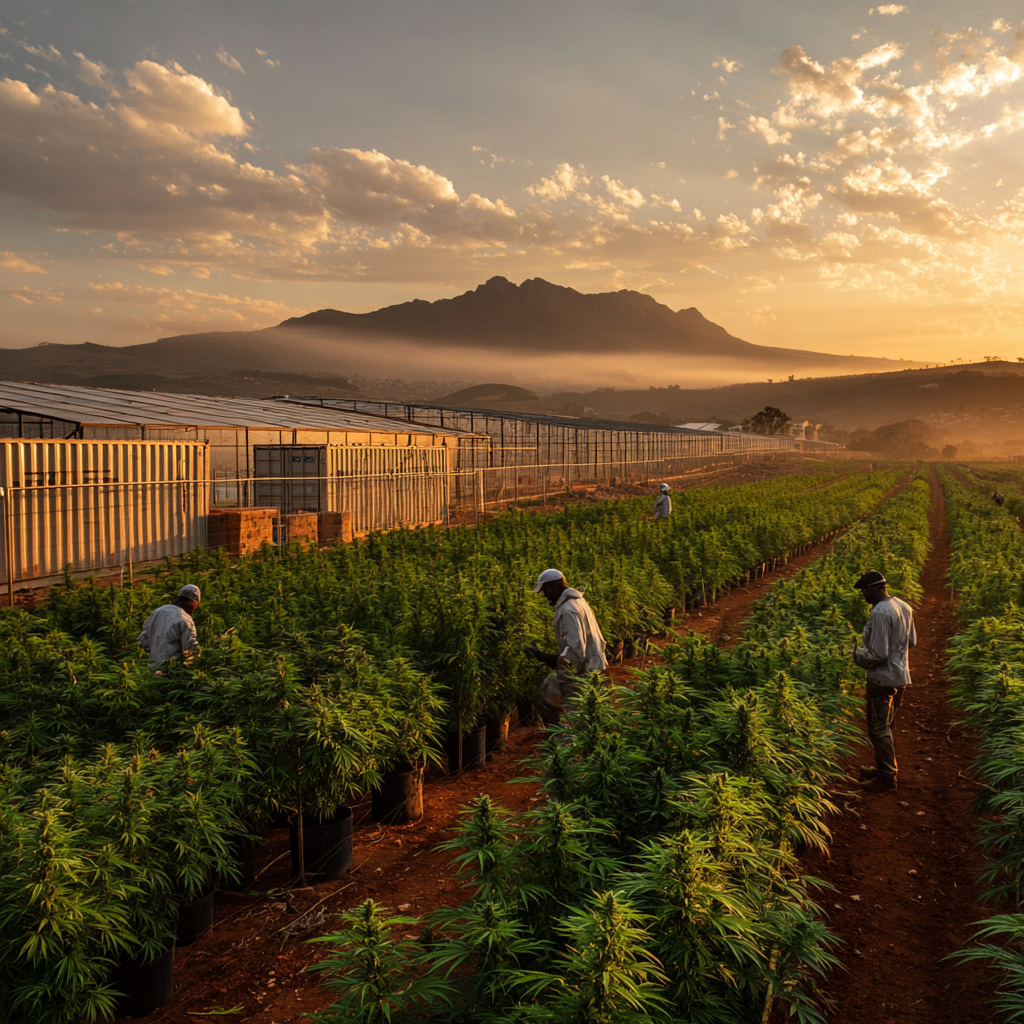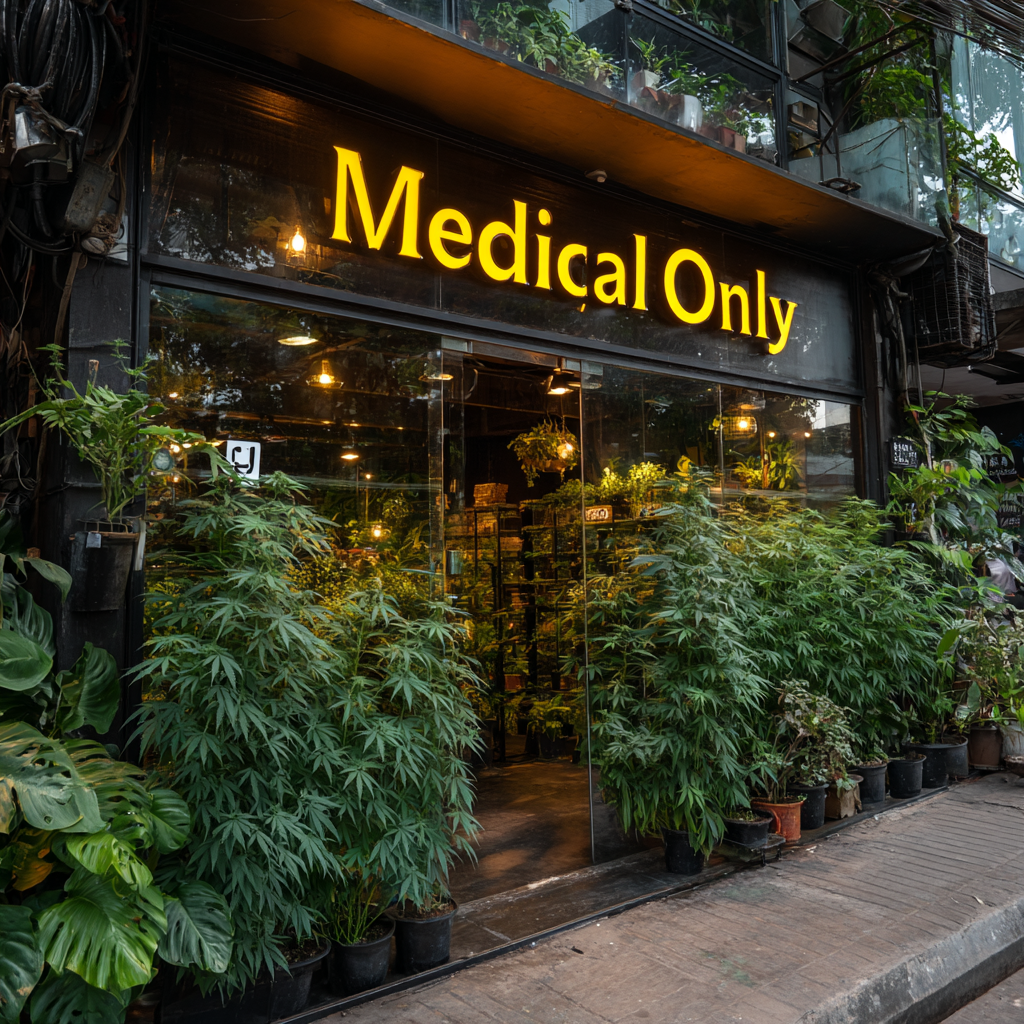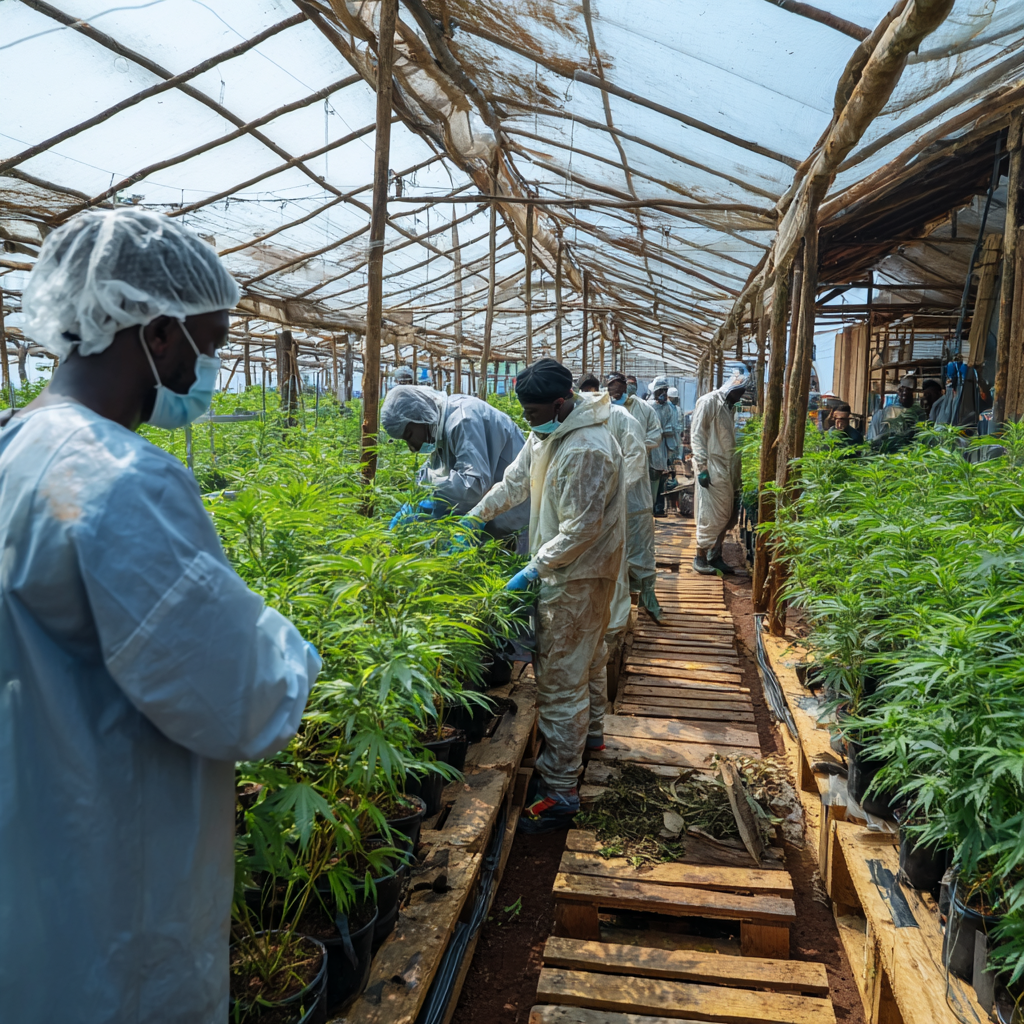South Africa Emerges as Cannabis Export Leader with National Master Plan

South Africa is gearing up as an international cannabis giant with the support of the government pushing cultivation and export licences, as the country’s intentions to dominate global commercial hemp and cannabis production are announced by President Ramaphosa.
South Africa has become the continental hub of the cannabis business sector with about 70 up-and-running facilities and full government support through the National Cannabis Master Plan. SAHPRA has already granted 1,408 cultivation licenses as well as 120 export permits, showing hitherto unseen regulation support for the business.
President Cyril Ramaphosa underscored the turning point during his 2025 State of the Nation Address speech, saying: “We want South Africa to lead the commercial production of hemp and cannabis.”
It now employs more than 90,000 workers within the rural areas, transforming the sector into the largest job-creation industry within the agricultural areas. A big policy gain was the drafted amendment that would increase THC levels from the globe’s most rigid 0.2% standard to 2%, aiming to meet the problems that the strong sunlight of South Africa presents as THC content rises normally.
This shift will ease compliance for farmers and open up wider industrial applications ranging from textiles to construction materials. International trade missions as well as the African Continental Free Trade Agreement are, through the Department of Trade, Industry and Competition, allowing South African producers to access international market opportunities, including the Middle East and Asia.
In May 2024, the Cannabis for Private Purposes Act was passed, and a blanket Cannabis Bill is likely to consolidate all the regulations by mid-2027.
Favorable climate, increasing demand for medicinal goods, as well as the impending Hemp and Cannabis Commercialisation Policy likely to be approved by Cabinet before April 2026, has positioned South Africa as the gateway to African cannabis reaching international markets.
Source: sanews.gov.za
India’s Cannabis Medicine Market Poised for $4.7 Billion Growth by 2032

The Indian medical cannabis market is likely to reach $4.7 billion by 2032 with a stellar growth rate of 17.34%, encouraged by the government initiatives to approve the medicinal use as also the reacceptance of the use of cannabis through traditional Ayurvedic medical practices.
The Indian CBD market is also showing rapid growth, rising from $1.3 billion in 2024 to an expected $4.7 billion in 2032. Such an impressive compound annual growth rate of 17.34% is a result of rising acceptance of cannabis for medicinal purposes as well as government efforts to decriminalize the use of cannabis within the pharmaceutical industry. Cannabis has deep roots in Ayurvedic practice, and modern scientific studies are now confirming what this ancient tradition has long understood.
Recent policy shifts have precipitated this growth, including the September 2024 Himachal Pradesh Assembly resolution to legalize cultivation of cannabis for medicinal and indigenous industry purposes, spearheaded by Revenue Minister Jagat Singh Negi. Uttarakhand, Uttar Pradesh, Madhya Pradesh. Also Jammu & Kashmir states have initiated or announced regulated cannabis cultivation for scientific research and medical applications.
India’s specific cannabinoid medicine market is projected to hit $1.2 billion by 2025, based on Insights10 research. Science initiatives are gathering steam, with the Council of Scientific & Industrial Research (CSIR) obtaining India’s first government license to research cannabis with the Bombay Hemp Company.
A historic tripartite agreement among the Indian Council of Medical Research (ICMR), CSIR, and the Department of Biotechnology (DBT) has been inked for active clinical development of pharmaceuticals based on cannabis derivatives to treat chronic pain, epilepsy, and cancer.
With over 5.5% of India’s arable land lying fallow, regulated cannabis cultivation could both utilize untapped resources and boost farmer incomes. India already holds 11.1% of the global cannabis oil export market, generating $320.8 million in revenue in 2019—positioning the country as a major player in the emerging medical cannabis industry.
Source: marketsandata.com
Thailand’s Cannabis Industry Faces Major Regulatory Overhaul with Medical-Only Rules

Thailand implemented blanket new regulations mandating doctor prescriptions preceding all cannabis sales, a stark reversal of the previous decriminalization approach as the country follows Asian neighbors to limit adult access.
Thailand has essentially overhauled its cannabis scene with fresh health ministry guidelines taking effect on June 2025, mandating doctor prescriptions on all cannabis sales and relocating cannabis flowers among controlled herbs.
The sudden policy change impacts more than 11,200 licensed cannabis shops throughout the country and heralds back into effect a medical-only cannabis regime after a three-year period where they decriminalized access. Public Health Minister Somsak Thepsutin signed the statement restricting cannabis to medical use alone, buyers must now show both doctor prescriptions and medical certificates showing their sickness.
However when a friend contacted Fat Buds in Bangkok they stated that a prescription can be arranged in 5 minutes for 100 baht.
The Policy shift came after a political storm where the pro-cannabis Bhumjaithai Party pulled out of the ruling coalition, paving the way for the conservative Pheu Thai Party to tighten regulations, which may yet be reversed with a new pro cannabis prime minister Anutin Charnvirakul recently taking over.
Between October 2024 and March 2025, over 800 cannabis traffickers were arrested and more than nine metric tons confiscated, generating pressure for tighter controls.
The sector had created considerable job opportunities among farmers, shopkeepers, and workers, as the cities of Bangkok and Chiang Mai organized cannabis festivals with global icons such as Mike Tyson.
Thailand’s about-face reveals the political delicacy of Asian cannabis policy, where governments ranging from those of Singapore, Japan, South Korea, China, Indonesia, Malaysia, and the Philippines enforce strict prohibition.
Source: cnn.com
Uganda Pioneers East African Cannabis Export with $60 Million International Contracts

Uganda has emerged as East Africa’s cannabis export leader through Bright Sparks Farm Limited’s experimental license, securing $60 million in contracts with Germany and Canada while maintaining strict export-only policies that prohibit domestic consumption!
Uganda has emerged as the most advanced export base of cannabis in East Africa after granting an experimental permit to Bright Sparks Farm Limited in July 2025 to cultivate, process, and export medicinal cannabis.
It has so far secured export orders valued at $60 million with pharmaceutical markets headquartered in Canada and Germany, even as it maintains rigid domestic prohibition on the use of cannabis. The Israeli-Ugandan venture between Together Pharma and Industrial Hemp operates the first country-based commercial cannabis farm around Kasese, where over 110 local laborers are used, preparing medical-grade cannabis under strictly controlled conditions.
Uganda’s regulations necessitate minimum $5-million capital requirements as well as $1-million bank guarantees as a condition to receive cultivation and export licensure. In the year 2019 the EU licenced the exportation of Uganda’s cannabis, making the country a legitimate international supplier to medical markets.
Anti-narcotics police escort all the cannabis produce, farm to airport, to prevent diversion to the local markets. Chief agronomist Emmanuel Emokol, who trained in Israel, has emerged as one of the prominent experts on cannabis in Uganda, taking charge of the cultivation challenges in a country where very little expertise exists on the cultivation of the crop.
The facility near Kasese demonstrates Uganda’s comparative advantages including favorable climate, low labor costs, and strategic positioning for African market expansion. Workers earn starting wages of $4.30 per day for manual tasks including harvesting, drying, checking, and packaging cannabis for pharmaceutical export.
Uganda’s approach differs from regional neighbors by focusing exclusively on export markets while maintaining domestic prohibition, contrasting with Tanzania and Kenya where large amounts of cannabis are grown and exported illegally. The success of Uganda’s export-only model positions the country as a potential template for other East African nations seeking to capitalize on the global medical cannabis market while maintaining strict domestic controls.
With demand growing in Europe and North America, Uganda’s established infrastructure and proven export capabilities provide a foundation for expanded international market penetration across multiple continents.
Source: african.business
Germany Reports Decreased Youth Cannabis Use Following 2024 Legalization

Germany’s historical reversal of prohibition has decreased youth consumption while boosted adult use, as the September 2025 “Drogenaffinitätsstudie” survey among 7,000 young people reveals, proving effective youth protection measures to be effective.
Germany reached a milestone in cannabis policy as recent research reveals that youth cannabis use has declined after the country’s historic partial legalization on April 1, 2024.
As part of the extensive “Drogenaffinitätsstudie 2025” released by the Federal Institute for Public Health (BIÖG), the use of cannabis among young people aged between 12-17 years decreased from 6.7% in 2023 to 6.1% in 2025, while daily or nearly daily use (more than ten times a year) declined correspondingly from 1.3% to 1.1% over the same period.
Based on the survey that targeted 7,000 young persons between April and July 2025, the research stands in direct contradiction to the criticism that there would be a rise in youth cannabis use as a result of legalization.
Germany’s cannabis law permits adults to carry up to 25 grams publicly and up to 50 grams privately, allowing home grow of up to three plants among adults. The law created non-commercial cultivation clubs (cannabis clubs) capped at 500 members each as a legally sanctioned alternative to black market acquisition.
Cannabis clubs can issue up to 25 grams daily and 50 grams monthly to adult members, although special limitations hold for young adults under age 21 who receive a maximum amount of 30 grams of cannabis containing THC no more than 10%.
The research findings will be conveyed during the German Addiction Congress Berlin where the results can be used as prime data during the planned evaluation of the current policies set to be carried out in October 2025.
The report supports the measured practice of cannabis regulation in Germany, where youth protection is the priority, including age restriction, consumption zone bans, and schooling programs.
Though young adult use (18-25 years) rose as predicted after liberalization, the reduction in minor use implies that properly protected markets with adequate safeguards are capable of excluding children from access to cannabis. The German approach is being observed intently throughout Europe, as the nation enters the first formal evaluation report, due October 1, 2025. It will analyze effects on organized crime, public health, road safety, and criminal justice burden.
As import quotas approach the 122-ton threshold set by international drug control bodies and debate continues over medical cannabis prescription restrictions, Germany is refining its approach to become a global model for evidence-based drug policy reform.
Source: digitaldaily.de


